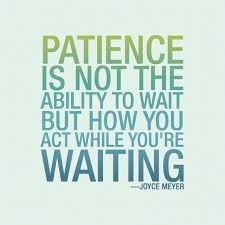Comparisons: the Fullness of Patience
The Art of War 7:5.10-16 Use discipline to await the chaos of battle.
This post continues our project explaining each stanza of Sun Tzu’s work. The English and Chinese quotes are from my award-winning translation, The Art of War and The Ancient Chinese Revealed. Start here for the book’s opening lines.
The six lines discussed in this article are the last two stanzas in Section Five of Chapter 7 of The Art of War. The general topic of this chapter is Armed Conflict. This section starts with the importance of enthusiasm, but then it changes to waiting to use emotion at the proper time. But what gives us the ability to wait in a specific situation? Strangely enough, an attitude that is the opposite of that condition we are waiting for.
The Patience of Opposites
Each line of this first stanza, sets up a pair of opposites as the needed ingredients to create patience. We act in one way to prepare ourselves for a condition that is the opposite of our behavior.
In the section below, we summarize each Chinese character with a single English word shown in < > brackets. The line of Chinese is followed by an English sentence translation.
<By> <means> <of> <govern> <await> <disorder>
Use discipline to await the chaos of battle.
<Govern> is the use of order by a leader, the requirement of discipline to define ranks and roles in a structured organization. What is the advantage of this organization? It allows us to be patient enough to await situations that are chaotic. Organization is boring and predictable, but chaos is its opposite, surprising and unexpected. Organization may be predictable, but we know what is required. Periods of chaos may be more interesting, but they are also more confusing. We know where we are in ordered situations. We are lost in chaotic ones.
By being organized, we prepare ourselves for chaos. We will not be swept up or swept away by it. Why do we want to await chaotic situations? Because, in the long run, chaos is inevitable. And the changes of chaos are the source of all opportunity. Controlled ground is being managed, that is, used and eventually it is use up, reaching the point of diminishing returns. We need new ground created by chaos.
<By> <means> <of> <tranquil> <await> <uproar>
Keep relaxed to await a crisis.
In well-ordered situations, we can relax, knowing what to expect next, knowing our role and the roles of others. Peace of mind is easy, because everyone knows what to expect. However, this tranquility is temporary. Climate drives constant change in our environment. The future is constantly driving us forward into unexplored territory.
Keep reading with a 7-day free trial
Subscribe to Practical Strategy Based on Sun Tzu's Art of War to keep reading this post and get 7 days of free access to the full post archives.





